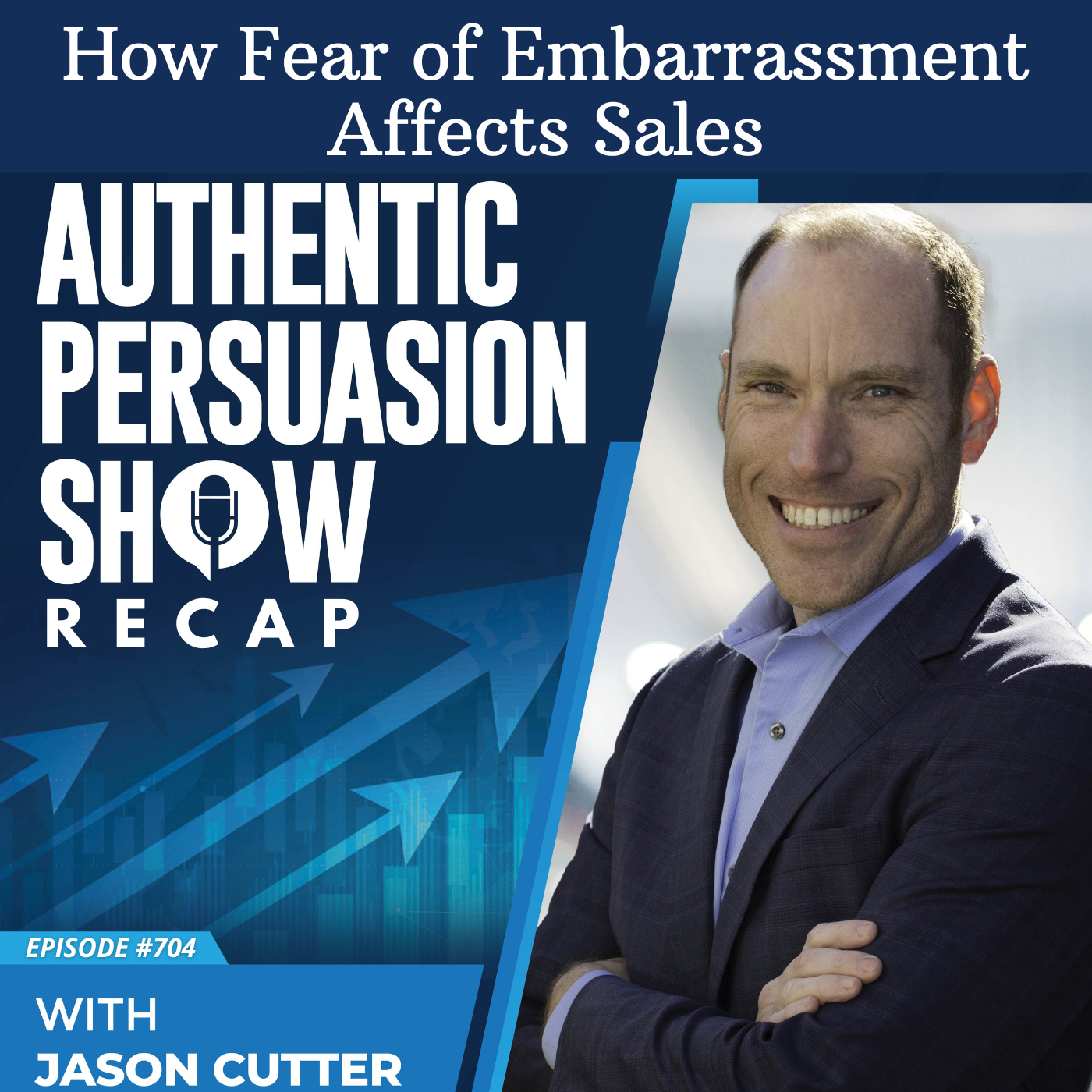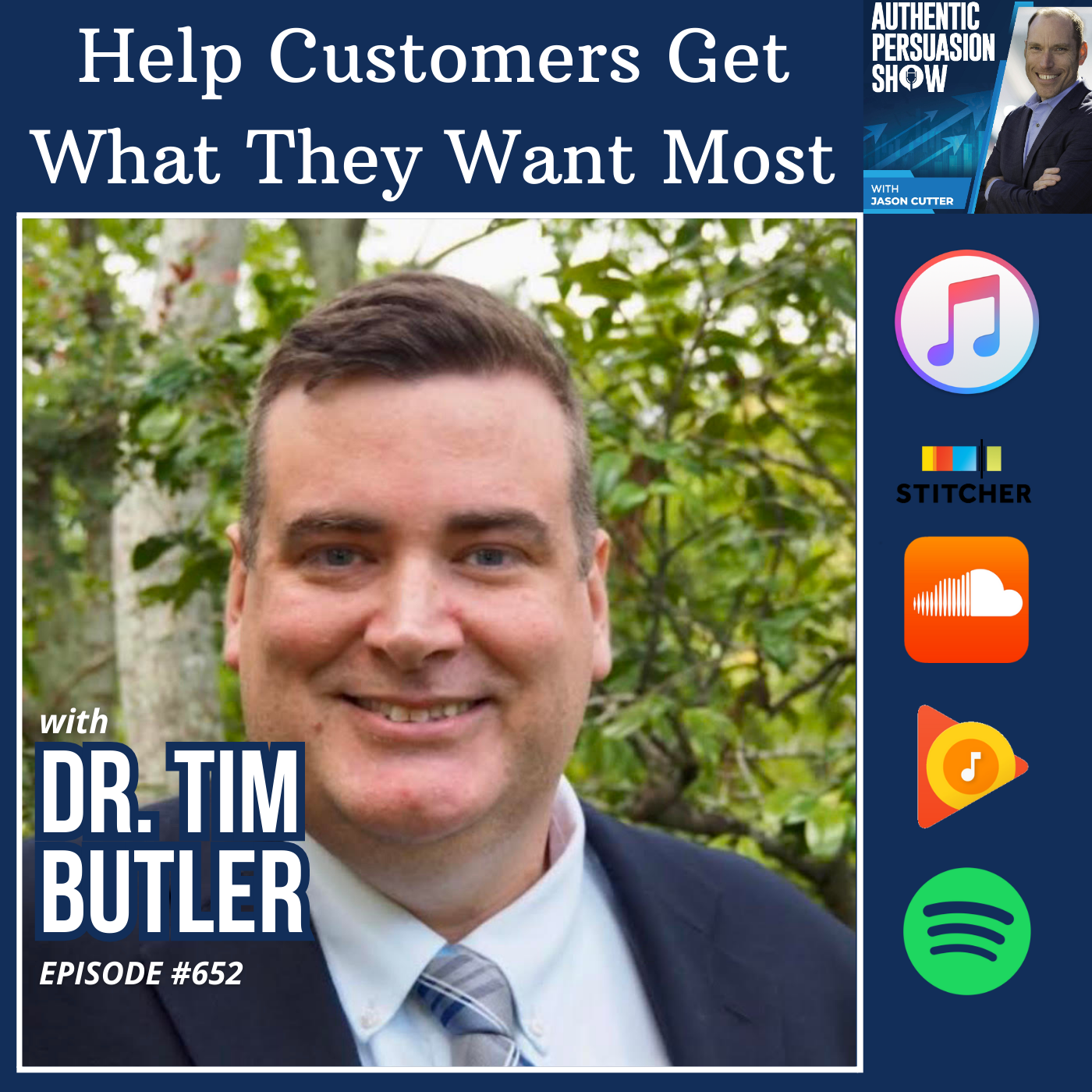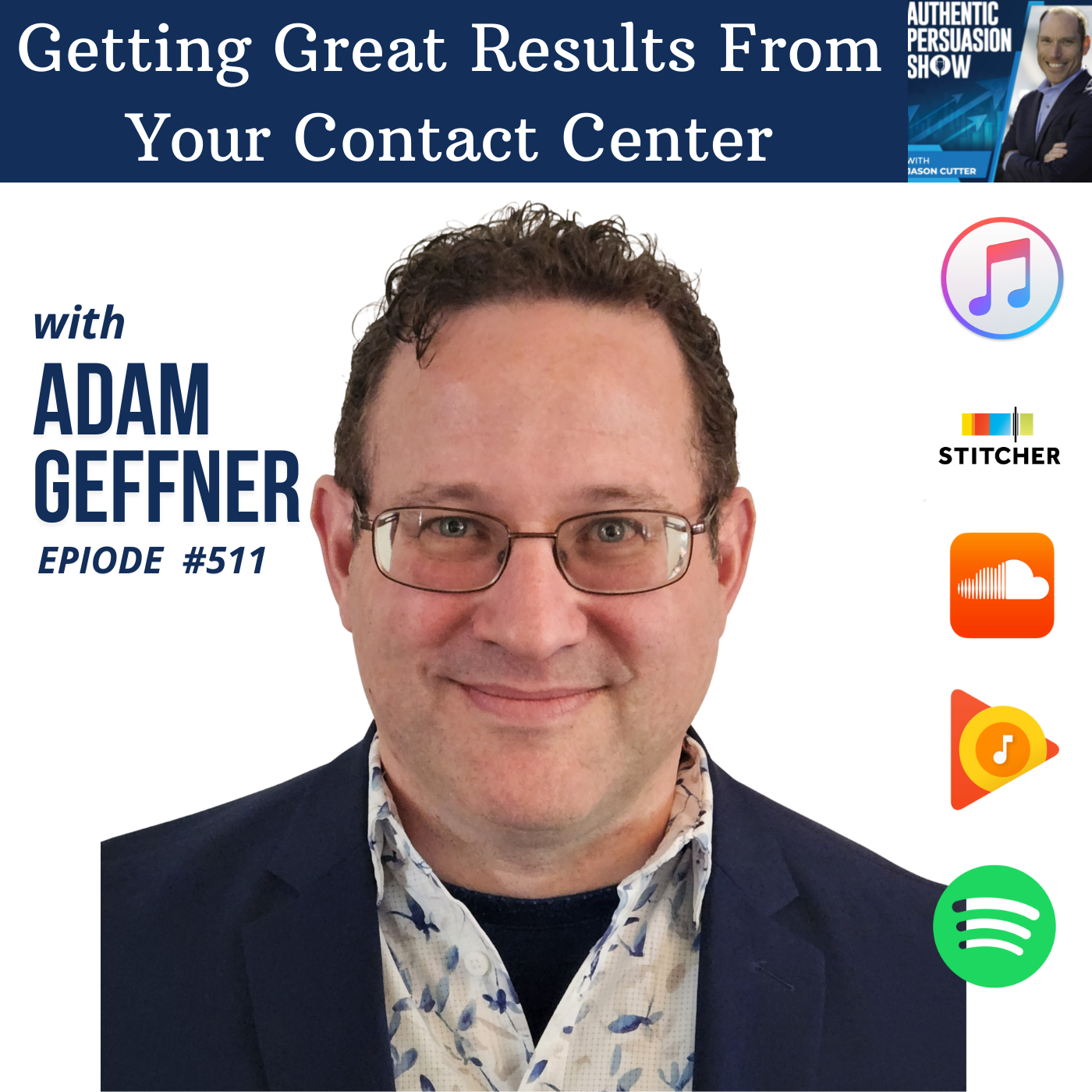Show Notes
This is the final segment of the conversation I had with Jamie.
In Part 4, Jamie and I talk about:
- Success is all about intentions
- Just because you’re selling pre-planning for death doesn’t make you the Grim Reaper
- Recruiting the right sales people
- Separating yourself by caring about your prospects
- Providing differentiating value
Download The Power of Authentic Persuasion ebook
Enroll in the Authentic Persuasion Online Course
Connect with Jason on LinkedIn
Connect with Jamie on LinkedIn
Jamie’s Bio:
My calling is helping people be less afraid of death. By helping them to provide their loved ones with a planned and funded funeral or memorial service, they create a path for bereavement, long before it’s needed. Truly, I help people live a better, more meaningful life.
A seasoned speaker, I bring deep experience in death care to a broad range of audiences around the country, sharing insights and approaches on how to have those difficult conversations and how to address sensitive issues. Extending well beyond death and dying, my message resonates across industries and individuals, bridging my passion to demystify death while enlightening communicators on overcoming challenging conversations.
Her Links & Contact Info:
Linkedin: https://www.linkedin.com/in/jamie-sarche/
Twitter: https://twitter.com/jamie_sarche
Phone: 720-403-6772
Email: [email protected]
Interesting Videos of Jamie:
More Video: https://elitalks.org/death-rituals-creating-jewish-life
E159 – Transcript
Jason: Welcome back to the sales experience podcast. I’m so glad that you’re here. This is the final part of my conversation with Jamie Sarche and it’s been such an interesting one in thinking about it. When we had this conversation, it was just so fascinating and all over the place. I tried many times to bring it back into sales, but then I know I was getting distracted talking about her industry and how that works and and just you know the thought process that goes into it. But I love and appreciate how much she is focused on doing sales the right way and doing it really different than anything else and if you haven’t listened to the first three parts, it’s very important because it’s one continuous conversation. We have a yes, you can get some information from the standalone episode, but listen to the other ones. She’s so fascinating. And then she has her links at the end of this, but you can also get them on the website, make sure to reach out to her, follow her online, get in touch with her if you want. You know, she posts some interesting content both around the pre-planning for you know, the inevitable death that’s going to happen as well as just sales and relationship stuff. So she’s very fascinated. Make sure to follow her here is part four.
Jamie: And so sometimes being able to separate that, who I am from what I do, sometimes it gets a little bit more difficult to do that. And so then I have to just be able to think about it. And again, I’ve been doing this long enough, then I know how to talk to myself about it and how to get back out of that idea that I am responsible for how they respond.
Jason: And for me, what I’ve always found is the key part that I focus on is my intentions, right? So my intentions are positive. I’m trying to help somebody then if they don’t react positively, but I know my intentions and my heart is in the right place and I’m not being an ass right like I am and there’s not a bad tone, it’s nothing I did on my side. Then I step back and always say and remind myself that if they’re acting like that, it’s because of something else going on in their life. And fundamentally everybody has something going on in their life at any moment. There’s some kind of storm, some kind of problems, some kind of thing they’re going through. And so their reaction to the outside world, if my intentions are good, that’s not about me. That’s about what they’re dealing with. And I could totally see that in your case because we’re calling as the grim Reaper because if somebody doesn’t sign up with you, then they see you in some way as that grim Reaper who just wants to talk about death and make them realize it. And so I could see that terrible timing, you know, just by chance where you’re calling there at the doctor’s office. And then there’s like, I have to see the cardiologist, he’s probably got bad news for me. And then here’s the bringer of death calling me and wants to sell me some stuff.
Jamie: And even sometimes they’ll think like that. The hospital called me to tell me to call them, which is interesting. And I’ve started, you know, in the last couple of years, maybe even just in the last year, I’ve started to just so much on that to say, Oh my God, I hate when this happens. You know, I can’t possibly know where you are, but wow, it really just is terrible timing. I’m so sorry. And I just kind of own that. And then they go, well, how could, you know where I was and one that’s better.
Jason: And I think that’s important for all sales people to understand and, and roll with them. I work with a lot of reps who don’t kind of flow with that kind of conversation. They get, you know, confronted with something by a prospect and, you know, they’re like, I don’t know how to react. I’m like, just react like a normal person. Just have the conversation and just address whatever it is that they’re accusing you of or thinking that you did or didn’t do. And uh, you know, like you said, how could you have known, you know, and I could just see you literally saying like, yeah, I mean it’s not like I’m tapped into the security cameras at the hospital, you know, calling people as they’re walking in. Like, however that would be a good business model, maybe I should check it out and then just make light of it. And then they realized, yeah, that’s probably not the case. Like this is, I’m being crazy.
Jamie: Yeah. And the other thing that, you know, I faced, and I’m sure every salesperson does face this, is people who answer their phone and they shouldn’t have answered their phone. And then they’re mad at us that they answered their phone. You know, when you’re in a, they’ll say, Oh, I’m in a meeting right now. And I think, well, that’s what voicemail is for. Why didn’t you just send me there? But you know, we’ve got to deal with it.
Jason: Yeah. And then, uh, set up a better time to talk and then just keep rolling with it. Yeah. That’s interesting. So now, do you have anyone on your team that you work with or are you pretty much just by yourself?
Jamie: So I’m very deeply connected with all of the funeral directors here. So we’re all a team. But I am the only person who does Prairie ranch funeral planning. Pierre and I have had a number of people who I’ve tried to bring in to do this with me. And it’s just never, it’s never worked for me. I’m not sure why I’m not a great manager. I really own that, that I, I am not a great manager. And so the other thing that I kind of have an expectation that if somebody wants to do this work, they would have the same passion that I have about it. And I haven’t found that person yet.
Jason: Yeah. And I could see that being challenging. And I know from managing and leading recruiting, hiring salespeople for a long time, that is always a struggle, which is to find somebody who cares or will do it a certain way and not even the way that it has to be done, but with the right intent, with the right goals, and ask the right questions and uncover the right things and then you know, address those concerns and do it in a sensitive manner. And then obviously with your line of work, in my mind it’s even more extreme. Right? So you’re not just helping somebody buy something or sign up for service. We’re talking about something very sensitive, like you said, that’s taboo that people don’t like talking about yet. It’s one common thing for everybody and yeah, I could see that being difficult on the recruiting side and getting somebody that you know feels the same way
Jamie: Exactly. And can interact with people in that kind of way. Recently we hired someone who’s a director of outreach and she does more kind of at need stuff. So she’s with nursing homes and hospices. I’m typically working with people decades before death. She would be, you know, kind of helping people to understand that we are available for when people are gonna die soon. But, um, she’s really the first person I’ve worked with that I can, I feel like I can trust so deeply that she gets it on such a deep level that I feel like she’ll go out to networking events and kind of represent me, which I’ve never allowed before. And it’s just something about who she is and I feel really lucky to have found that.
Jason: Now have you thought about training or teaching, coaching, anybody else in other markets that are doing this?
Jamie: Yeah, I have and I would actually really like to do that. I have been a speaker at the IFCCA conference in Las Vegas, which is the, I think, international funeral, cremation and cemetery association. So I was a speaker last year and I’m going to be a speaker again. I have trained people at an insurance company for the marketing people. Um, but I really would like to do that. And my funeral home owner has asked me not to do it in the Denver market, which I respect completely yet. But I really would like to do that. And I do think that what I’m doing is really so much better for the funeral business and for people. You know, one of the things that I see in the funeral business is really a fight to the bottom, a race to the bottom that we’ve really commodified the work that we do. And I see that as a huge mistake, you know, for the people we serve. And certainly for the business as a whole, you know, if, if it’s just about picking up the body and burning it, anybody could do that. And when it’s about caring for people and helping them to get their needs met and helping them to understand what needs are, I think that we can really do so much more for people. And I’m not sure that my industry is doing that.
Jason: Yeah. Well. So for anybody who might be listening, obviously that’s in the same industry and wants your assistance, sounds like you would be a great resource and that could be a fun match. But I got to say like if anyone was looking at me right now or a couple of minutes ago when you were talking, I was literally like laughing because I guess I’m still, even at this point in my life, I’m still surprised at the different types of associations, groups and then conferences and expos that are out there as you’re talking about this international association of funeral and cremation centers. I’m just like, Oh my God, there’s something.
Jamie: Yeah. But you know what’s funny, I was talking to somebody yesterday and she was saying, you know, death is really on trend right now and that, yeah, and I don’t know if you’re paying attention to this, but like two days ago there was an article in the Washington post about green burial and at the same time there was something going around LinkedIn about the funding that these people who are doing grief support just got, there’s a whole new thing in Washington state that there’s literally body composting and I think that’s going to become legal in Colorado. In fact, I’m trying to work to make it legal in Colorado that’s happening right now. So there really is a lot of talk. I think that we are experiencing a little shift culturally in kind of embracing the fact that death is part of life.
Jason: And how much of that do you think is just this large population of baby boomers who are now dealing with it and they’re also part of a generation that’s also connected also online also, you know, not like where let’s say when I was a kid, my grandparents, great grandparents, so disconnected from other generations. Whereas the baby boomers, there’s a lot of them that are connected. They’re online. They’re a part of so much.
Jamie: No, I don’t know. I do just think that there a lot of shifting happening culturally and you know, one of the things that we’re seeing a lot of is that people are not connected religiously and so they’re trying to figure out some things how to do those things that religious communities would have taken care of and they don’t have that anymore. Which is also why I think that we don’t have a lot of ritual anymore. You know, ritual is certainly a big important part of religion, but it’s something separate as well and we need it. It really isn’t about God. It really is about how we walk through these kinds of milestones.
Jason: Yeah. And I, and I think one of the other rituals that’s really missing is the coming of age teenager becoming an adult. You know, where in some religions there’s a big passage and a Rite of passage and a ceremony that goes with that. And there’s just not that same thing like we’ve had, you know, for so long religion or not, right. I mean there’s tribal societies where they do that religious, but it’s that ceremony, it’s that tradition, it’s that Rite of passage. And so then you’ve got one at the end of life as well.
Jamie: That’s right. I don’t know how if you wouldn’t have children or how old they are, but when my kids were driving, learning to drive, they did this thing called master drive. And that was one of the things that this organization really focuses on is that learning to drive and becoming a driver is a huge Rite of passage and we need to treat it in that way. And I thought that was so smart. You know, it just, it does help us to grow, to have those rites of passage.
Jason: I remember that as a kid. I mean that was a huge deal. Driver’s training, drivers, education, and then you know, back in the day getting my license on my 16th birthday, the MV and you know what that meant as a milestone.
Jamie: Yeah. So we need to embrace those milestones. They really are helpful in helping us connect with our own lives.
Jason: Yeah. Well Jamie, I appreciate you being on here. This is definitely in the top of the most fascinating topics and for salespeople, listening, managers, owners, obviously we talked about some sales stuff. There’s a lot of value in there and then it’s just a fascinating topic that I love sharing and sharing your message about helping people understand it and break that down. Where is the best place? I’ll put all the links in the show notes on the website for you, but like where’s the best place for now if they’re listening to it where somebody can find you, what do you want them to find online or connected with you?
Jamie: So absolutely they should connect with me on LinkedIn and I’ve got a lot of videos there. I would love for them to email me. My email is [email protected] and they’re welcome to call me too if they want and it’s (720) 404-6772 I really look forward to connecting and I’m so grateful for you having me on this podcast and it’s so fun to talk about and I really appreciate the spirit in which you talk about this too. Thank you.
Jason: Well thanks Jamie. And seriously for anyone listening to this, if you’re in this industry, obviously reach out to her if you’re dealing with sales. I mean she knows a lot of stuff about sales and a lot of interesting things so, but again, thank you for being on the show and uh, and talking about this, the sensitive but necessary sales topic.
Jamie: Absolutely. Thanks.
Jason: And for everyone listening, make sure to go to the cutterconsultinggroup.com website and go to podcasts. You can find the transcript for our conversation, all of Jamie’s links that you can also reach out to me and chat if you want to talk about sales. And as always, keep in mind that everything in life is sales and people remember the experience you gave them.
![[E159] Selling The One Thing Everyone Needs with Jamie Sarche – Part 4 of 4](https://episodes.castos.com/salesexperiencepodcast/images/Jamie-Sarche-Cover-Image.png)


